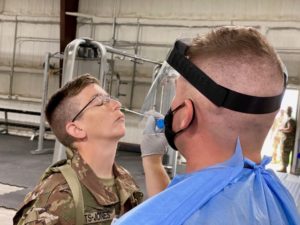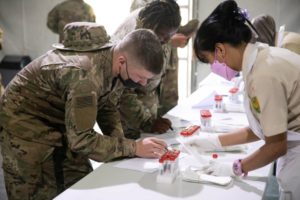
Soldiers with the 28th Expeditionary Combat Aviation Brigade receive tests for COVID-19 at their mobilization station at Fort Hood, TX in July. Now, military personnel are being told to get the vaccine or undergo more frequent testing. Army Photo by Capt. Travis Mueller
WASHINGTON — The DoD plans to request a presidential waiver to require all servicemembers to receive the COVID-19 vaccine starting in mid-September, according to a memo sent by Defense Secretary Lloyd Austin.
The mandatory jabs could begin even sooner if the vaccines receive U.S. Food and Drug Administration approval in August or early September, as no waiver is needed for the military to mandate fully approved vaccines.
A memo sent to all forces put the decision in the context of military readiness, with a caveat that changes in infection rates could also move up the deadline. “I will not hesitate to act sooner or recommend a different course to the President if l feel the need to do so. To defend this Nation, we need a healthy and ready force,” Austin said.
President Joseph Biden said he strongly supported adding the COVID-19 vaccine to the list of mandatory immunizations for servicemembers not later than mid-September. He added that “being vaccinated will enable our servicemembers to stay healthy, to better protect their families, and to ensure that our force is ready to operate anywhere in the world.”
The change in policy comes just days after Biden’s announcement that all federal employees would be required to complete their vaccinations or be subject to masking, social distancing and mandatory testing. Biden also asked the DoD to examine adding the COVID-19 vaccine to the required shots for servicemembers.
In the weeks before the mandatory vaccinations kick in, the services will work out policies for servicemembers who have medical or religious objections to the vaccines and how to handle others who refuse the shot. Policies for civilian employees and contractors will have to be developed as well.
About one million servicemembers are now fully vaccinated and another 237,000 have received their first jab.
Delta Driving Changes

A U.S. Army soldier with the 25th Infantry Division checks in for a COVID-19 test in Baturaja, Indonesia, late last month. Garuda Shield is a joint-exercise to enhance the jungle warfare ability of both the U.S. and Indonesian armies, while alsoe mitigating COVID-19 risk through vaccination, testing, and quarantine procedures. U.S. Army photo by Spc. Rachel Christensen
The decision to require vaccination comes as the delta variant’s spread has spurred a nationwide surge in COVID-19 cases and hospitalizations, with more than 95% of serious illness and deaths among unvaccinated individuals. It also followed the death of two sailors in one week from complications from the disease. The Navy noted that only one fully vaccinated sailor or Marine has required hospitalization for COVID-19 compared to 123 hospitalizations among unvaccinated sailors and Marines.
The increase in cases led the DoD to once again require masks for personnel in late July, regardless of vaccine status, in indoor setting in parts of the country designated by the U.S. Centers for Disease Control and Prevention as having “substantial” or “high” risk for COVID-19 transmission. Two-thirds of U.S. counties meet the criteria for having “high” or “substantial” risk of transmission.
“COVID-19 remains a significant and evolving threat to our nation’s security,” said Deputy Pentagon Press Secretary Jamal Brown. “The rise of the delta variant and the speed with which it transmits make these additional protective efforts all the more vital to protecting our force and the nation we defend.”
The EUA Quandary
Talk of requiring the COVID-19 vaccine for military members had been circulating for months. On its own, the DoD cannot mandate a vaccine with emergency use authorization (EUA) rather than full approval from the U.S. Food and Drug Administration (FDA). A 2003 law requires servicemembers receiving vaccinations under an EUA to understand “the option to accept or refuse administration of the product, of the consequences, if any, of refusing administration of the product.” The law also provides a way to require such vaccines: “if the President determines, in writing, that complying with such requirement is not in the interests of national security.”
Biden had been unwilling to take that step as vaccination rates rose and cases plummeted this spring. In recent months, several admirals and other Defense leaders publicly stated that they expected approval of one or more of the vaccines shortly and would require immunization at that point.
A message sent to Army leadership in late June, HQDA EXORD 225-21, noted that “Commanders will continue COVID-19 vaccination operations and prepare for a directive to mandate COVID-19 vaccination for service members [on or about] 01 September 2021, pending full FDA licensure.”
The sharp rise in cases since June increased concern that the virus could impair military readiness and overtax military and civilian hospitals again, despite the availability of a vaccine to everyone over the age of 12. That led to a multifront push to find ways to boost vaccine uptake.
Shortly before Biden’s announcement of the vaccine mandate for federal workers, the Department of Justice issued an opinion that the law granting the FDA the authority to issue EUAs “does not prohibit entities from imposing vaccination requirements” associated with employment, education, event attendance, or other activities for vaccines with emergency use authorization. The DOJ memo echoed guidance issued by the Equal Employment Opportunity Commission in May that said employers could require vaccination of employees, if they also comply with the Americans with Disability Act and other relevant laws.
